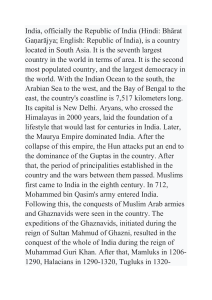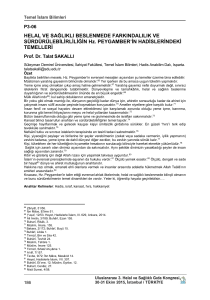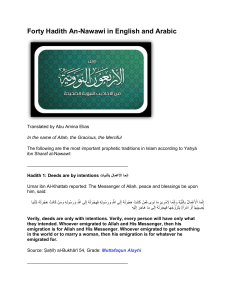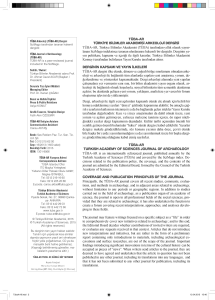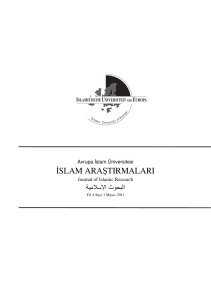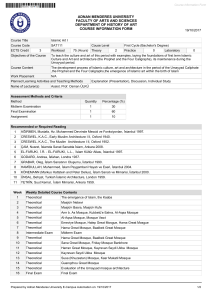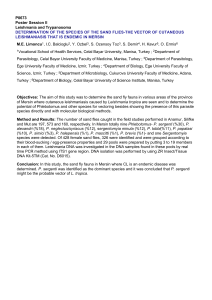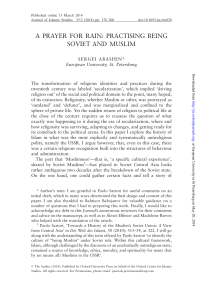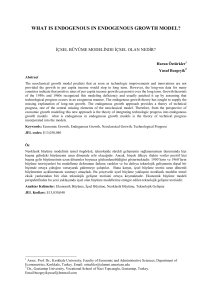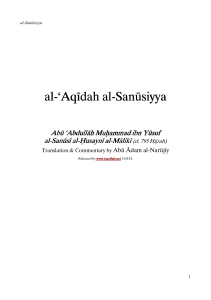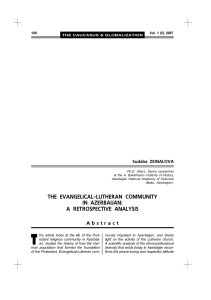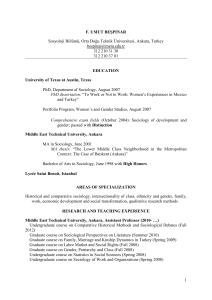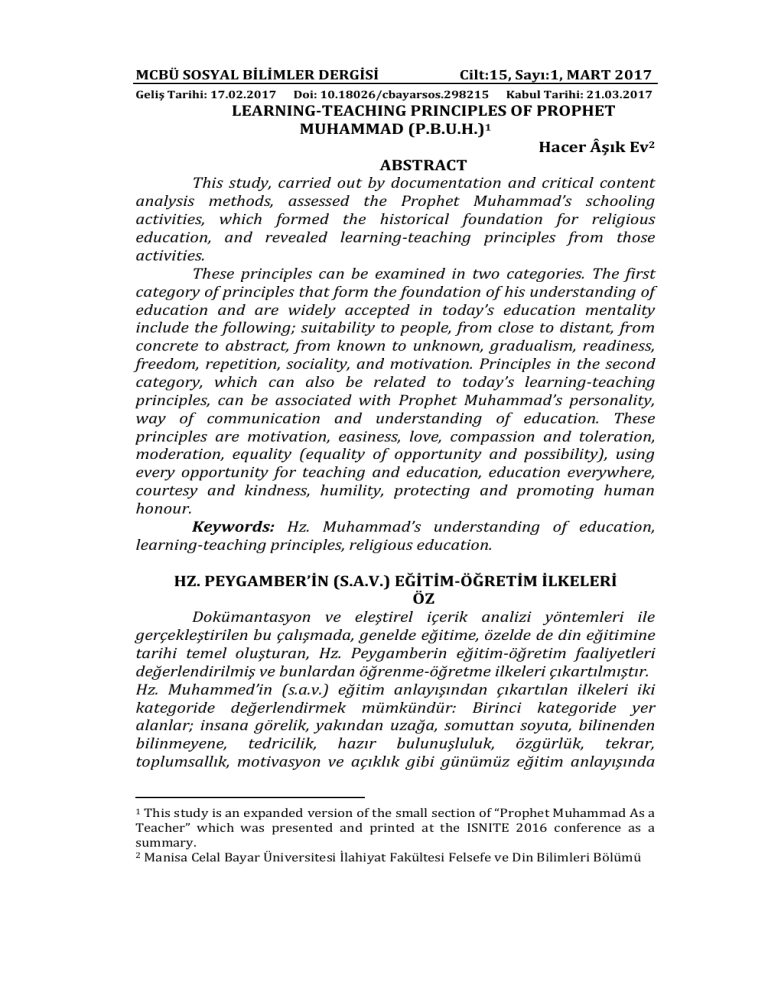
MCBÜ SOSYAL BİLİMLER DERGİSİ
Geliş Tarihi: 17.02.2017
Cilt:15, Sayı:1, MART 2017
Doi: 10.18026/cbayarsos.298215
Kabul Tarihi: 21.03.2017
LEARNING-TEACHING PRINCIPLES OF PROPHET
MUHAMMAD (P.B.U.H.)1
Hacer Âşık Ev2
ABSTRACT
This study, carried out by documentation and critical content
analysis methods, assessed the Prophet Muhammad’s schooling
activities, which formed the historical foundation for religious
education, and revealed learning-teaching principles from those
activities.
These principles can be examined in two categories. The first
category of principles that form the foundation of his understanding of
education and are widely accepted in today’s education mentality
include the following; suitability to people, from close to distant, from
concrete to abstract, from known to unknown, gradualism, readiness,
freedom, repetition, sociality, and motivation. Principles in the second
category, which can also be related to today’s learning-teaching
principles, can be associated with Prophet Muhammad’s personality,
way of communication and understanding of education. These
principles are motivation, easiness, love, compassion and toleration,
moderation, equality (equality of opportunity and possibility), using
every opportunity for teaching and education, education everywhere,
courtesy and kindness, humility, protecting and promoting human
honour.
Keywords: Hz. Muhammad’s understanding of education,
learning-teaching principles, religious education.
HZ. PEYGAMBER’İN (S.A.V.) EĞİTİM-ÖĞRETİM İLKELERİ
ÖZ
Dokümantasyon ve eleştirel içerik analizi yöntemleri ile
gerçekleştirilen bu çalışmada, genelde eğitime, özelde de din eğitimine
tarihi temel oluşturan, Hz. Peygamberin eğitim-öğretim faaliyetleri
değerlendirilmiş ve bunlardan öğrenme-öğretme ilkeleri çıkartılmıştır.
Hz. Muhammed’in (s.a.v.) eğitim anlayışından çıkartılan ilkeleri iki
kategoride değerlendirmek mümkündür: Birinci kategoride yer
alanlar; insana görelik, yakından uzağa, somuttan soyuta, bilinenden
bilinmeyene, tedricilik, hazır bulunuşluluk, özgürlük, tekrar,
toplumsallık, motivasyon ve açıklık gibi günümüz eğitim anlayışında
This study is an expanded version of the small section of “Prophet Muhammad As a
Teacher” which was presented and printed at the ISNITE 2016 conference as a
summary.
2 Manisa Celal Bayar Üniversitesi İlahiyat Fakültesi Felsefe ve Din Bilimleri Bölümü
1
Hacer ÂŞIK EV
da kabul gören öğrenme-öğretim ilkeleridir. İkinci kategoride yer
alanlar
ise,
günümüz
öğrenme-öğretim
ilkeleri
ile
ilişkilendirilebilmekle birlikte daha çok Hz. Peygamber’in kişiliğini,
iletişim biçimini, eğitim anlayışını yansıtan, Hz. Peygambere özgü
ilkelerdir. Bunlar da; kolaylık; sevdirme ve ikna etme, hoşgörü ve sevgi,
şefkat; itidal; eşitlik (fırsat ve imkan eşitliği); her yerde eğitim;
insanların eğitimi için bütün imkanlardan yararlanma; itidal; estetikzerafet-vefa; alçakgönüllülük ve insan onurunu korumak ve
yüceltmektir.
Anahtar Kelimeler: Hz. Peygamberin eğitim anlayışı,
öğrenme-öğretim ilkeleri, din eğitimi.
INTRODUCTION
Throughout history, it is seen that a lot of important
characters interested in problems of humanity, such as educators,
philosophers, scholars, religious functionaries, contemplated on
those problems and made various efforts in trying to find solutions
for the reformation of psychologically, socially and culturally
degenerated societies. Prophets were closely interested in those
individual and social problems as well. They notified orders,
principles and advices of religion and carried them into life, thus
contributing towards solutions as being role models and guides. The
Prophet Muhammad (p.b.u.h.) tried to make a corrupted and
retrogressive society liveable again as part of the prophetic mission
that was given to him by Allah and as an individual, even though he
faced various difficulties. He says that he performed his
responsibility with education-teaching (schooling) activities. Besides,
the holy book of Islam, the Quran, entitles the Prophet’s mission as an
education mission as well (The Quran, Bakara, 1/151). The Prophet
Muhammad performed this mission actively as being a guide and a
role model for people during his prophethood life exceeding 22years.
According to the Quran, human beings are not born with
learned knowledge but rather were provided with potential skills
suitable for learning (The Quran, An-Nahl, 16/78). One of the most
important objectives of Islam is the realization of one’s self and to
discover and improve abilities of humans who are born without a
knowledge from the wombs of their mothers. The first teachereducator who was charged to achieve this aim was the Prophet
Muhammad. The Quran informs that aims of religion were realized in
the most perfect way in the Prophet Muhammad and he was a guide
714 | Manisa Celal Bayar Universitesi Sosyal Bilimler Dergisi – Cilt: 15, Sayı: 1, Mart 2017
Learning-Teaching Principles of Prophet Muhammad (P.B.U.H.)
and role model for people in achieving those aims (The Quran, AlAhzab, 33/21) and the Quran wants people to follow his role model’s
footsteps (The Quran, Al-Hashr, 59/7). The Prophet Muhammad
informed as well that one of his duties was teaching (Canan, C. 1,
379) and as. As a teacher he gave particular importance to informing
people of Islam, spreading the knowledge, putting knowledge into
practice in his daily life and making it as permanent component of
life (Yavuz, 1988)
With schooling activities, the Prophet Muhammad (p.b.u.h.)
tried to form a new world view on people and built a new society
based on principles such as equality, justice, brotherhood and
sisterhood, life in harmony and peace, socialization, cooperation etc.
He achieved this aim by trying to make emotional, intellectual and
behavioural changes in people from different age groups and
developmental periods like children, adolescents, adults and seniors.
The environment where he performed his schooling activities was
everywhere he found the opportunity: houses, places where people
were in masses, bazaars, fairs, masjids (small mosques), etc.
Understanding of education and activities of the Prophet
Muhammad are worth examining from the educational aspect,
especially religious education, because they form the foundation of
religious education and teaching activities.
This study, carried out by documentation and critical content
analysis methods, will be assessing the Prophet Muhammad’s
schooling activities, which form the historical foundation for
education, and will be revealing learning-teaching principles from
those activities.
A. Learning-Teaching Principles, Used in Today’s
Education Understanding, Inferred from Educational
Applications and Comprehension of Education of The
Prophet Muhammad
Principles obtained from activities the Prophet Muhammad
(p.b.u.h.) performed while reforming the society through guiding
people to the good can be allocated into two categories. The first
category of principles that form the foundation of his understanding
of education and are widely accepted in today’s education mentality
include suitability to people, from close to distant, from concrete to
abstract, from known to unknown, gradualism, readiness, freedom,
repetition, sociality, and motivation. Principles in the second
category, which can also be related to today’s learning-teaching
principles, can be associated with the Prophet Muhammad’s
Beşeri Bilimler Sayısı
| 715
Hacer ÂŞIK EV
personality, way of communication and understanding of education.
These principles are motivation, easiness, love, compassion and
toleration, moderation, equality (equality of opportunity and
possibility), using every opportunity for teaching and education,
education everywhere, courtesy and kindness, humility, protecting
and promoting human honour. To sum up, personal traits,
comprehension of communication, education and teaching of
Prophet Muhammad underlie the principles of both categories thus
the principles are a mere reflection of the Prophet Muhammad.
Hence, in 159th verse of Surah Ali ‘Imran in the Quran, “You treated
them leniently by mercy from Allah. If you had been rude, hard-hearted,
they would have disbanded and gone from you” Allah says to Prophet
Muhammad.
1. The Principle of Suitability to the People
It is seen that the Prophet Muhammad who said “We, the
prophets, were ordered to speak to people according to their intellects”
paid attention to developmental levels, interest, needs, chances that
they have, psychology and comprehension-understanding levels of
people with whom he communicated. For example, When the Prophet
Muhammad forbade people from sitting on the roads (since the
geography they had in was too hot, people was sitting in front of their
houses and stores), people said that they could not do it; therefore, he
said that they could keep this habit providing that they did not
discomfort other people with their looks, guided passenger, prayed like
bless you-live healthy for people who sneeze and praise and took
salaam of people who greet (E. M. C. II. 384). As it is seen here, the
Prophet Muhammad did not ignore wants and limitedness that
companions had said they could not do, He took in consideration and
turned to account.
As another example, when Abu Hurairah who was a poor
companion asked “What kind of sadaqah (voluntary charity) is the
most virtuous?”, He said “It is poor’s helping to people with his/her
strength”; when tribal leader Sa'd ibn Ubadah asked the same question,
He said “It is having water well dug and providing water” (Canan, C. 9,
No date: 266). In this example the Prophet Muhammad took
economic conditions of companions into account and stated what the
most virtuous sadaqah is for both of them. If he had said the same
thing for both of them, he would not have taken economic condition
of companions into account.
716 | Manisa Celal Bayar Universitesi Sosyal Bilimler Dergisi – Cilt: 15, Sayı: 1, Mart 2017
Learning-Teaching Principles of Prophet Muhammad (P.B.U.H.)
Another example which can be thought to be related to this
principle again is that He said to a person who asked about fasting
each day in every month, when companion said that he could do more,
He said to him to fast two days in every month and again when
companion said that he could do more, He said him to fast three days in
every month (E. M. II, 538-539).
The Prophet Muhammad’s not extending the prayer, keeping it
short by reciting short surah when leading prayer in masjid and
hearing children voice, (Canan; 2010) and advising companions:
“When you lead prayer, do not recite long (do not extend prayer).
There can be sick, old people, passengers who have short time”
(Hamidullah, 1969: 64) are other examples which can be given for
principle of suitability to the people. When he noticed that his
companions
were
distracted,
their
understanding
and
comprehension decreased while he was informing people, he had a
break of education-teaching (Yılmaz, 2010). Abdullah ibn Masud said,
“The Prophet Muhammad would look for day and time about sermon
and advice in order not to bore us” (Zebidi, I. Vol. 1984: 77).
When the Prophet Muhammad paid attention to features,
interests and wants of his companions, he did not equate people who
just started to learn to people who came a certain point and the
things that he taught and messages that he gave to each of them used
to be different (Yılmaz. 2010: 351). For example, “Do not get angry”
He ordered to a companion who said three times “The messenger of
Allah, give me advice” (Zebidî, I. C. 1984: 148), “Fear Allah wherever
you are! Do favour after you commit a sin so that favour eliminates sin.
Behave well to the people!” He said to another companion who asked
the same question (Yılmaz. 2010: 351-352).
The Prophet Muhammad asked companions to lower
themselves according to the people’s level (Abu Dawud, Good Manners.
20) and talk to the people as they can understand (Bukhari,
Knowledge, 49). He warned Ibn Abbas by saying “Ibn Abbas! Do not
say anything to people which they cannot understand. Doing this
causes sedition” (Yılmaz. 2010: 352).
2. The Principle of From Close to Distant
In order to make messages that he wanted to convey more
understandable and achieve more permanent learning, the Prophet
Muhammad gave examples from close natural environment of people
time to time. For example, in order to tell how bad and ugly it is to
backbite, he asked people next to him who do eat meat of a dead,
swelled donkey that they run across, when they objected “is it eatable?”
with disgust, he said “the person who gossips will be worse, will be as if
Beşeri Bilimler Sayısı
| 717
Hacer ÂŞIK EV
he/she ate meat of a dead human” (E. M., II, 90-91). In this case, he
pointed out the badness of backbiting and consequences of it by
using an object that people saw and caught the bad smell of it in their
close environment. This hadith can be also shown as example for
principle of from concrete to abstract.
Another example about principle of from close to distant is
that the Prophet Muhammad likened Muslim to date palm which has
always leaf, which gives fruit. In this comparison, by using date palm
that companions knew closely, raised and benefited from its shade
and fruit, the Prophet Muhammad tried to tell that also Muslims
should always do useful things for people and so it would be
valuable.
Pedagogical value of following an order from close to distant
starting from learner’s natural and social environment in educationteaching activities is great (Okutan, 1997:56). As making connections
by giving examples from physical and psycho-social-cultural
environment that person lives makes learning easier and learned
things permanent, it also makes comprehension and understanding
of mind expand like circles expanding outwards that a stone which is
thrown to water creates (Âşık Ev, Educational View of Ibn Khaldun).
3. The Principle of From Concrete to Abstract, From
Known to Unknown
One day, the Prophet Muhammad drew a square on ground
with a stick. Then he drew a line in the middle of it, he drew a line
outside of it. Then he drew several small lines attached to that central
line and explained, “This line is human being. This square which
encircles it is time of death. This line which is outside the square is his
desire. These small lines which intersect the line of desire are
calamities. Even if this line of calamity misses him by losing its way,
another will touch. If that one misses, time of death line will touch.”.
Another example is: “One day the Prophet Muhammad was holding
two pebbles. He threw one of them to close and the other one to a
distance and asked companions what these pebbles mean. They
answered “The messenger of Allah knows better.” So, he said “The
closer one is desire, the further one is time of death. While people are
trying to achieve desire, death catches them.”(Zebidî, I. C. 1984:179180).
Third example about the principle of from concrete to
abstract, from the known to the unknown is: “The Prophet
Muhammad showed dead goat cub to the companions and asked how
718| Manisa Celal Bayar Universitesi Sosyal Bilimler Dergisi – Cilt: 15, Sayı: 1, Mart 2017
Learning-Teaching Principles of Prophet Muhammad (P.B.U.H.)
much money they would give in order to take it. After they said that
dead goat cub had no value for them, the Prophet said, “the world is
much more worthless than it for Allah” (E.M. II. 338-339). Here, by
using an object (dead goat) that companions could see, catch the bad
smell of it and touch with their hands, He wanted companions to
comprehend, understand an abstract subject like “transience,
worthless of the world and hereafter’s being more valuable and
permanent.”
In another hadith, after the Prophet Muhammad drops leaves
of a deadwood by hitting with his stick, he indicates that sins of people
who keep Allah in their minds will be forgiven as leaves of deadwood
drop (E. M. I. 636). Again in this hadith, the Prophet Muhammad
utilized a concrete fact like “dropping leaves of deadwood” in order
for companions to understand an abstract subject like forgiving sins
of people who do not ignore Allah. Other examples which can be
given for this principle can be the hadiths that “Person who covers up
a fault of Muslim will gain sawab (merit or reward that God gives in
return for good deeds and piety) like saving a girl who is buried alive
(E. M. II, 118), “By showing his companions a mother who is looking for
her lost child meanwhile taking every one of the children she finds to
her bosom with the longing she has for her child, “Do you think this
woman would ever throw her child into the fire? The mercy of Allah to
the people is much more than this woman has for her baby” (Hadislerle
İslam, Vol. 3, 2014:76).
It is seen in these hadiths that it is started from objects and
subjects which can be held with hand, seen with eye, examined by
taking to pieces and then it is progressed to teaching abstract
concepts like desires and death of people, the value of the world, the
importance of remembering Allah, virtue of covering up other
people’s faults and love and compassion of Allah to the people.
Starting learning with concrete things is important in terms of
harmonising learning with mental development of people both owing
to adding more senses into the learning activity and owing to the fact
that human mental development progresses from concrete to
abstract (Büyükkaragöz, Çivi, 1999: 55).
These hadiths can be also examples for principles of from
known to unknown situations.
4. The Principle of Gradualism (From Simple to
Complex, From Easy to Difficult)
By saying to Muadh whom the Prophet Muhammad sent to
Yemen as governor:
Beşeri Bilimler Sayısı
| 719
Hacer ÂŞIK EV
“O, Muadh! Certainly you are going a society where People of
the Book live. First of all, invite them to shahada. If they obey this,
inform them that Allah has enjoined on them five times prayer a day. If
they accept and obey this, inform them that zakat (obligatory charity
tax) has been enjoined on them as taking from the rich amongst them
and giving to the poor amongst them” (Hadislerle İslam, C. 2, 2014:
455), he wanted people to be taught religion incrementally not all
together. He did in this way in his own practices because learning
and bringing a thing into the life gradually are easier than learning
and practising as a whole at a sitting and person will not be bored,
exhausted.
“The Prophet said to a person who asked about fast to fast a
day in every month, when companion said that he could do more, He
said him to fast two days in every month and again when companion
said that he could do more, He said him to fast three days in every
month (E. M. II, 538-539). Also this hadith can be shown as an
example for this principle.
5. The Principle of Readiness
The Prophet Muhammad (s.a.v.) pointed to efficiency of
maturation and entry behaviours which are necessary for learning in
his hadith “Muslim is not stung twice from the same hole” (E. M. II.
633). Here, the mistake that person makes, being hurt by anything or
being cheated are negative experience for a person. At the same time,
this is learning and forms past experiences for next learning of
person and helps person to notice future harmful results and have a
more careful attitude. If person meets negative conditions again,
he/she will find solutions to eliminate negativity or not to be hurt
since he/she is ready- has experience and learning, he/she will not
be stung from the same hole again. Also, he/she will have readiness
for next learning.
6. The Principle of Freedom
“Anas whose childhood passed near the Prophet Muhammad
said “I lived with the Prophet for ten years, as he never said “ugh” to me
and never said “I wish you had done it” for a job that I did not do, he did
not say “why did you do this?” for a job I did” (E. M. I. 292). “Just as we
were about to start prayer, a Bedouin came and told Prophet that he
had very few work to finish, he was worried of forgetting it if it was
delayed after prayer and told him to wait for himself, the Prophet
waited for Bedouin by standing to finish his work and started prayer
after Bedouin had finished his work (E. M. I. 292-293). These examples
720 | Manisa Celal Bayar Universitesi Sosyal Bilimler Dergisi – Cilt: 15, Sayı: 1, Mart 2017
Learning-Teaching Principles of Prophet Muhammad (P.B.U.H.)
show that the Prophet Muhammad was not oppressive, prohibitive
against people and he gave people freedom of action. He allowed
people for acting freely, did not choose the way of delaying their
wants as long as possible.
“When companions said to the Prophet that they felt something
that they refrained to tell and they were uncomfortable for this, the
Prophet said “this is the clearest faith” (E. M. II. 673) and relieved
them and this is an example which shows that he did not limit
freedom of thought besides freedom of action.
7. The Principle of Repetition
When the Prophet Muhammad wanted to motivate listeners
with taking the attentions and in order to provide permanent
learning in topics that he considered as important, he used principle
of repetition very often. For example, his saying “Pay attention to
prayer” (E. M. I. 174) over and over again is because of the
importance of the subject and providing permanent, effective
learning. In another hadith, the Prophet Muhammad repeated
expression of lying too much while he was counting big sins, thereupon
Abu Bakr wished him not to say anymore in order for him not to be
sorry (E. M. I. 19-20). The Prophet’s repeating that “lying is from big
sins” over and over again was for the purpose that he wanted people
to learn effectively and permanently how this behaviour was bad and
wrong.
Also Anas Ibn Malik told that “The messenger of Allah
sometimes used to repeat his words three times in order to be
understood easily (Hadislerle İslam, Vol. 6, 2014:409).
8. The Principle of Sociality
“In loving each other, showing mercy and compassion to each
other, the Prophet Muhammad likens Muslims (believers) to a body
which other organs of it share the pain with sleeplessness and high
fever when an organ of it becomes sick”(Hadislerle İslam, Vol. 3, 2014:
351). According to this, people who are like the organs of a body
need each other in order to be a whole “body” and they should love,
watch and guard each other to be able to create a healthy and
appropriate society. According to the Prophet Muhammad’s
informing, this is also an obligation for faith to be accepted because
he ordered that “"None of you will believe until you want for your
believer brother what you want for yourself” (Hadislerle İslam, Vol. 3,
2014: 271).
The Prophet Muhammad informed that people who live in a
society have social responsibilities to each other such as visiting
patients (E. M. I. 523-545), attending funerals (E. M. II. 286-290),
Beşeri Bilimler Sayısı
| 721
Hacer ÂŞIK EV
doing favour to the relatives (E. M. I. 56-79), helping needy people (E.
M. I. 229). So that, he prescribed “Whoever goes to bed with a full
stomach while his neighbour is hungry is not from us” and said “Gabriel
commended the neighbour to me so much that I thought he would
make neighbour heir” ( Zebîdî, C. 12, 1984: 130).
In his another hadith, the Prophet Muhammad said, “A Muslim
is a mirror to another Muslim, Muslim is brother/sister of another
Muslim, he/she protects him/her and satisfies his/her needs” (E. M. I.
253). In this hadith, the Prophet Muhammad emphasised that people
show similar characteristics as a result of communication and
interaction, they protect each other with the sense of belonging,
satisfy their needs and this is what it should be, also he reported that
those good attitudes would be rewarded by Allah: “Whoever removes
from a Muslim a distress of the world distresses, Allah will remove one
of his/her distress on the Day of Judgment. Whoever eases the hardship
of a person who is in difficulty, Allah will ease his/her works in this
world and the next. Whoever covers up the fault of a Muslim, Allah will
cover up his/her faults in this world and the next. As long as servant
goes on helping his/her brother/sister, Allah will go on helping
her/him” (Hadislerle İslam, Vol. 3, 2014: 351). However, people also
will not be impunity when they do not discharge their
responsibilities for each other: According to the Prophet
Muhammad’s informing “Allah delays any punishment until the Day of
Judgment, however, behaving wildly, being rebel to mother-father,
breaking off the relation of kinship are exceptional. Punishments of
these sins are given to their owners before they die” (E. M. I. 595-596).
The underlying thought of forbidding usury is the thought
that all the Muslims (believers) are siblings of each other and so they
should help each other financially just as in all points (Watt, 2016:
345).
The Prophet Muhammad warned and encouraged his friends
about doing the requirements of communal living: He wanted the
poor Ashab al-Suffa to be helped about meeting their food needs and
others who needed help to satisfy their needs by saying “If you have
food for two people, invite a third person, if you have food for four
people, invite a fifth or sixth person” (Hadislerle İslam, Vol. 3, 2014:
259).
Since social consciousnesses (responsibilities) like greeting,
handshaking and giving-taking gifts bring hearts of people closer to
each other and strengthen the love among them, he advised, “Shake
722 | Manisa Celal Bayar Universitesi Sosyal Bilimler Dergisi – Cilt: 15, Sayı: 1, Mart 2017
Learning-Teaching Principles of Prophet Muhammad (P.B.U.H.)
hands and hatred will go away, give gifts to each other and your love
will increase and hostilities will disappear” (Hadislerle İslam, Vol. 3,
2014: 259, 358). He prohibited the attitudes which damage
brotherhood and intimacy of hearts. “Avoid suspicion! Suspicion is the
epitome of lie. Do not overhear your words. Do not search your private
situations. Do not be in the race of superiority. Do not envy each other.
Do not turn your back on each other. The people of Allah! Be brother
and sister.” (Hadislerle İslam, Vol. 3, 2014: 351). Another attitude that
harms brotherhood is “being cross.” The Prophet Muhammad stated
about this subject: “It is not permissible for a Muslim to be cross with
his/her religious fellow for more than three days.” “Making peace
between two people is more virtuous than prayer, fast and alms; on the
other hand, driving a wedge between two people eradicates faith”
(Hadislerle İslam, Vol. 3, 2014: 358, 361).
9. The Principle of Motivation (Encouragement)
“One day, while sitting with companions, the Prophet
Muhammad said: “Allah has such servants who are not martyrs or
prophets that prophets and martyrs will be envious of them in the day
of judgement because of their proximity to Allah.” Companions who
heard these words suddenly pricked up their ears and curiously asked:
“Oh, the messenger of Allah! Who are they?” The messenger of Allah
explained: “They are people who love each other just for Allah without
kinship or benefit of goods among them” (Hadislerle İslam, Vol. 3,
2014: 353). In this event, the Prophet Muhammad firstly drew
attentions of companions by saying “there are such people hereafter
that prophets and martyrs will be envious of them because of their
proximity to Allah” and motivated companions for learning. The fact
of “being a person that prophets and martyrs will be envious because
of the proximity to Allah” increased the motivation level of
companions for learning, interests and demands in terms of learning
how it would happen and putting it into practice.
It is seen that the Prophet Muhammad firstly created a living
interest and demand for learning by motivating target audience
while helping people learn, internalize and actualize religion and
social ethics-virtues that religion requires. One of the methods that
the Prophet Muhammad used, who did this in various ways, is to
motivate by way of encouraging, emboldening audience who were
timid. For example, when Ali, who was employed in his early ages as
qadi (judge) for Yemen, behaved timid reasoning that he was young
and inexperienced, the messenger of Allah encouraged Hazrat Ali by
praying with hitting his chest “My Allah, give the right way to his heart
and give perseverance to his tongue!” and told him how he needed to
Beşeri Bilimler Sayısı
| 723
Hacer ÂŞIK EV
judge in a case. Hazrat Ali said “I have never hesitated about judging
between two people after this.” As it is seen, the Prophet
Muhammad’s communication with children that he built on love,
compassion and honouring was much deeper and more effective with
the young. He adopted an honouring, reassuring, encouraging,
rational and moderate style in his communication with the young
(Hadislerle Müslümanlık, Vol. 6, 2014: 394).
It is understood that the Prophet Muhammad not only
overcame the lack of self-confidence of the young but also motivated
them by trying to overcome the lack of confidence of environment
against the young. An example about this is: Once upon a time, when
the Prophet Muhammad stationed Zayd ibn Harithah as commander
even though he was young, some of the companions hesitated about
his commandership. After years, when the Prophet Muhammad
stationed Usama, the son of Zayd, as commander to an army which
would be sent against Greeks, hesitations arose again. Whereupon,
the Prophet Muhammad both silenced objections and encouraged
young Usama by saying “Now you are talking about commandership of
Usama. Before that you talked about commandership of his father. I
swear to Allah, Usama is undoubtedly worth of this mission just like
how Zayd was worth of this mission” (Hadislerle Müslümanlık, Vol. 6,
2014: 394).
B. Principles Peculiar To The Prophet Muhammad
(p.b.u.h)
As it was stated before, the principles in this chapter are
principles which reflect personal characteristics, way of
communication and education-teaching characteristics of the
Prophet Muhammad, which are peculiar to him. These can be sorted
as easiness, love-compassion and toleration, moderation, equality
(equality of opportunity and possibility), education everywhere,
benefiting all the chances and places for education of people,
aesthetic-grace-fidelity, modesty, honesty, justice, goodwill-sincerity,
persisting, fulfilling the responsibility, clarity and distinctness,
protecting-exalting human honour.
1. The Principle of Easiness
The Prophet Muhammad, who said “There is beauty wherever
there is softness and easiness, everything which does not have easiness
is ugly” (Abu Dawud, Good Manners, 10), always adopted and applied
the principle of easiness. It is seen from Hazrat Aisha’s telling
“Prophet used to choose easy one when He was free to choose one job
724 | Manisa Celal Bayar Universitesi Sosyal Bilimler Dergisi – Cilt: 15, Sayı: 1, Mart 2017
Learning-Teaching Principles of Prophet Muhammad (P.B.U.H.)
between two jobs” (E. M. I. 288-289) and the Prophet’s “delaying Zuhr
prayer when it was extremely hot” that he preferred easier one when
he was in a position of choosing between two things.
The Prophet, who preferred and applied the easier one,
wanted people not to do things that pushed their toleration limits by
saying “Teach and make it easy” (E. M. II. 664), “Make things easy, do
not make things difficult” (E. M. I. 289, II. 528, 664). When the Prophet
Muhammad’s principle of “Make things easy, do not make things
difficult. Make them calm with glad tidings, do not repulse them” (E. M.
I. 289, II: 664) is brought into life, learning and teaching will move
away from vapidity and will become enjoyable, motivation will
increase and more effective and more permanent learning will occur.
2. The Principles of Love, Compassion and Tolerance
“His grandsons Hassan and Hussein used to come to masjid,
jump onto his back, sit and play when Prophet Muhammad was in
praying. So, his praying lasted for a long time.” “They entered the
masjid during Friday sermon; the Prophet Muhammad stopped the
sermon, embraced his grandsons, sat them down near him and then
resumed his sermon.” “The Prophet Muhammad sometimes sat Hassan
down near himself when he was on the minbar (pulpit in the mosque
where sermons are delivered to people)” (Canan, 2008: 168).
The Prophet Muhammad was extremely full of love and
compassionate also for all the children, adults and all the living things
as well as for his grandsons. Anas İbn Malik told a childhood memory
of him: “One day the messenger of Allah sent me to somewhere for a
job. While I was going, I run across the children playing on the street
and I was wrapped up in play with them and forgot my job. All of a
sudden I saw that the Messenger of Allah was standing behind me
holding my head and smiling. “Little Anas, go where I told you to go”
he said to me. I said “Alright the messenger of Allah, I am going right
away” (Hadislerle İslam, V. 3, 2014: 410).
As it is seen from transferred examples, the Prophet
Muhammad’s love for children and his communication with them are
very impressive. Children’s growing with love is very important in
terms of affective development and personality development. Selfconfidence, strength of thinking-acting freely, self expression and self
identification develop in children who grow with love, compassion
and tolerance. These children act with love and compassion to their
environment and they are tolerant, when their wants do not come
true they can develop empathy and they do not have hostile feelings.
Furthermore, creative intelligence is more functional in these
children.
Beşeri Bilimler Sayısı
| 725
Hacer ÂŞIK EV
Malik bin Huwairith’s narrating is an example for the Prophet
Muhammad’s compassion for the young. “We, the young, came to the
Prophet Muhammad and stayed with him (in Medina) for
approximately twenty nights. The Prophet Muhammad was very
merciful. When he perceived that we missed our families, “Go back to
your homeland and teach them what you have learnt” he said to us”
(Hadislerle Müslümanlık, Vol. 6, 2014: 389). Also in this event, the
Prophet Muhammad gently wanted the young to go back to their
families by reasoning their want for teaching their families what they
had learnt not their longing which might embarrass them.
TheProphet Muhammad, who said “Whoever does not have
mercy on the young and does not respect the old is not one of us” and
showed love and mercy to all the created things, wanted people to
love each other and emphasised with his words that this was a
necessity of faith: “You shall not enter heaven unless you believe, you
will not believe unless you love each other” (Hadislerle İslam, Vol. 3,
2014: 77). According to him, people should not only love each other
but also say that to each other because while telling love and giving
and taking presents increase the love between people, they decrease
the hostility. “When a man loves his religious brother he should tell him
that he loves him” and “give present to each other” (Hadislerle İslam,
Vol. 3, 2014: 81).
There are impressive examples about the Prophet
Muhammad’s tolerance: People of Mecca tormented, tortured him and
Muslims, boycotted them, left them dead by leaving them without
water and medicine and sent them away from their homeland where
they had been born and grown. When he entered Mecca on the head of
army which had conquered the city without the need for war, he called
out to the people of Mecca who were curiously and anxiously waiting:
“Community of Quraysh, now you are waiting for how I will behave to
you.” People of Mecca red-facedly answered by lowering their heads:
“We expect goodness from you because you are a noble brother
and son of a noble brother.” The Prophet Muhammad said, “I say “No
blame upon you today. May Allah forgive you. Allah is the most merciful
of the merciful” and added, “Go ahead, you are all free.” (Hadislerle
İslam, Vol. 3, 2014: 320).
While the Prophet Muhammad forgave and tolerated evils
which had been done to him, he also tolerated rude, wrong
behaviours that people did as they could not know and he corrected
these behaviours: A Bedouin started to urinate in one corner of masjid.
726 | Manisa Celal Bayar Universitesi Sosyal Bilimler Dergisi – Cilt: 15, Sayı: 1, Mart 2017
Learning-Teaching Principles of Prophet Muhammad (P.B.U.H.)
(Floor of the masjid was sand in those days). Companions who had seen
his situation rushed to restrain him. However, Allah’s Messenger
ordered them to leave him and pour a bucket of water over the place he
urinated. Then he said: “You have been sent to make things easy not
difficult.” He neither was angry with Bedouin nor said a bad word. On
the contrary, he closed him with tolerance and tried to make him notice
his fault by saying that it should not have been done in masjid. Thus, his
attitude showed result, Bedouin understood his fault” (Hadislerle
İslam, Vol. 3, 2014: 407).
According to Anas ibn Malik’s telling, “A Bedouin came to the
Prophet Muhammad, strongly pulled his robe and wanted him to give
something to him. Although Bedouin hurt him, the messenger of Allah
did not react negatively to that rude behaviour of Bedouin, in fact, he
ordered giving a sum of goods after he looked at him with compassion
and smiled” (Hadislerle İslam, Vol. 3, 2014: 410).
Adopting and actualising the principle of love and
compassion of the Prophet Muhammad who came upon a camel
whose belly was sticking to its back because of hunger and who said
that animals should not be tortured by saying “Fear Allah in respect of
these dumb animals” (Hadislerle İslam, Vol. 3, 2014: 549) is necessity
in today’s education understanding as well, in order to develop a
more humanist and more conscious generations.
3. The Principle of Moderation (Midway)
Sa'd b. Abi Waqqas narrated a memory of him about the
Prophet Muhammad: “When the messenger of Allah (p.b.u.h.) visited
me in the year of the last Hajj upon my illness’s progressing, I told
him “Allah's Messenger! As you see, my illness has proceeded. I have
no inheritors except my daughter. Can I give two-thirds of my
property as alms?” He ordered “No.” I said “Can I give half of it as
alms?” He ordered “No.” Then the messenger of Allah added, “Onethird is okay, and even one-third is much. It is better to leave your
inheritors wealthy” (Hadislerle İslam, Vol. 3, 2014: 35), “Allah wants
you to leave your children in welfare than expend everything for
charity and leave your inheritors in need in public” (Hamidullah,
1969:64).
Abdullah bin Amr from the companions tried to fast everyday
with the desire of being closer to Allah and spent the nights performing
prayer. The Prophet Muhammad told him: “Oh, Abdullah bin Amr! I
heard that you always fast during the day and perform prayer at night.
Do not do that because your body, your wife have rights on you.”
(Hadislerle İslam, Vol. 3, 2014: 102). One day, when the Prophet
Muhammad learnt that one of the believers was praying all nights,
Beşeri Bilimler Sayısı
| 727
Hacer ÂŞIK EV
other one was continually fasting apart from the month Ramadan,
third one promised not to marry ever with the fear of being constrained
from worship; he forbade them these (Bukhari, Marriage 1).
As it is seen in these examples, the Prophet Muhammad
informed that extremism is wrong even in worship, he warned
companions by saying “No matter which field of life it is, moderation is
essential before everything. Moderation will not be passed even in
prayer and fast” and advised them to live in moderation (to follow
midway) (Hamidullah, 1969).
The Prophet Muhammad who remarked that people should
be moderate in every field of life and worships advised moderation
also in emotions and ordered: “Love whom you love mildly that he
may become someone you do not love/enemy someday. Be moderate to
whom you do not love that he may become your friend. Hate whom you
hate mildly, he may become someone you love someday.” (Hadislerle
İslam, Vol. 3, 2014: 83). “Your hatred for a tribe should not affect your
being fair” (Hamidullah. 1969: 65).
It is seen that the Prophet Muhammad used the principle of
moderation (avoiding extremism, being moderate) while informing
people around, directing to goodness and making them avoid
badness. “Do not argue with your brother (to hostility), do not make
jokes with him injuriously, and do not make him a promise which you
cannot keep.” (Hadislerle İslam, Vol. 3, 2014: 295). Furthermore, he
took care of balance in determining target, and education; he did not
tire his companions, did not show targets which they would not get and
did not give responsibilities which they could not overcome (Yılmaz,
2010: 351).
When directing people to good and beauty, the Prophet
Muhammad sometimes heralded news with reward; when keeping
them out of shirk (ascribing partner(s) to Allah) and badness, he
warned them. For example, his heralding heaven to anyone who says
“La ilâhe illalah (There is no god but Allah) from heart with belief”
(Muslim, Faith, 52) is an example of this. While he heralded and
warned, he was moderate and careful of avoiding extremism.
The principle of moderation can be summarized with his
hadith “the best of every work is its middle” (Hamidullah, 1969: 64). It
means being functional in every education-teaching process, like
goals, content, duration of lesson, project, homework, assessment
and evaluation, holiday, etc. This principle is helpful for actualizing
728 | Manisa Celal Bayar Universitesi Sosyal Bilimler Dergisi – Cilt: 15, Sayı: 1, Mart 2017
Learning-Teaching Principles of Prophet Muhammad (P.B.U.H.)
more enjoyable, effective, active education-teaching and providing
permanent learning.
4. The Principle of Equality (Equality of Opportunity and
Possibility)
Bilal and Abu Dharr were arguing and “what do you know
about this, you are a son of black woman” said Abu Dharr to Bilal in an
unguarded moment. Bilal al-Habashi whose skin was black left that
place in a great sadness. The Prophet Muhammad who heard that
event called Abu Dharr. When Abu Dharr who was very sorry for his
mistake came, the Prophet Muhammad said: “So, you have pieces of
Jahiliyyah Period (Arabic culture before the arrival of Islam) (Arabs
used to contemn and exclude slaves, people whose skin colour was
black in Jahiliyyah Period before Islam). However, skin of human has no
value in Islam. Islam abolished difference of race, colour, family.
Advantage in the presence of Allah is only with piety. He said, “You
cannot enter heaven as long as Bilal do not forgive you.” Abu Dharr,
who became very sad and regretted, came to Bilal’s door, put his face to
the ground and said to Bilal “Here, I put my face to the ground. I will
not stand up until you step on my face.” Bilal forgave Abu Dharr by
saying: “Oh my dear brother, I forgave you, may Allah forgive you. This
face does not deserve trampling, it deserves kissing.”
A wealthy woman committed a theft in the period of the
Prophet Muhammad. That case made the people of Quraysh upset, they
discussed who would inform the Prophet about the case and they
decided that the Prophet’s loved one mediate to forgive the woman.
The Prophet Muhammad gave that historical answer which underlined
right and justice: Those who came before you were destroyed because
whenever a noble person among them stole, they would let him/her go.
But if a person who was weak stole, they would punish him/her. I swear
by Allah, if Fatimah the daughter of Muhammad were to steal, I would
definitely punish her” (Hadislerle İslam,Vol. 3, 2014: 367).
The Prophet Muhammad always emphasised that people
were born equal, nobody has advantages on anyone and everybody
has the same rights and he tried to provide equality of opportunity
and possibility among people. He led people about providing equality
of opportunity and possibility for every one of the people who was
oppressed and excluded as the poor, women, girls and slaves. The
hadith, whoever has a slave-girl should provide a good education to
her and give her freedom. Manumit her (Hamidullah, 1969: 79) is just
an example for it. In the Farewell Sermon, he emphasised the
equality which is one of the basic principles of Islam with his
historical words: “O people! Your Allah is one and your father is one.
Beşeri Bilimler Sayısı
| 729
Hacer ÂŞIK EV
All of you are from Adam, and Adam was created from the soil. The
noblest of you in Allah’s sight is the one who avoids disobeying. Arab
has no superiority over non-Arab. Superiority is only with piety”
(Hamidullah, 1969).
He included an article which was for making people from
different religions live in equal and in peace in a society in
Constitution of Medina: The Jews of Banu Awf are one community with
the believers. Jews have their religion, Muslims have their religion. This
is valid for both people under their protection (protectors) and
themselves except for people who do an injustice and behave vicious.
They will harm only themselves and their families. For the Jews Banu
Najjar, Banu Harith, …, it will be the same as the Jews of Banu Awf”
(Watt, Trans. Kalkan, 2016: 264).
The Prophet Muhammad tried to provide equality of
opportunity and possibility about especially education of ignored
woman in education-teaching activities besides social, political,
economic, law, etc. fields and be a model for companions about this
issue. It is known that he allowed a special day for educationteaching for women (Zebidi, I. Vol. 1984: 99).
5. The Principle of Using Every Opportunity for Teaching
and Education
The Prophet Muhammad used various places like house,
masjid, market-bazaar, fair, etc. and chances while teaching Islam
religion to the people and being model and guide for them. He
maintained his education activities by notifying revelations that he
took from Allah to the people firstly in his house, then in Erkam’s
house when his house was not enough. Arabs used to arrange fairs in
order for trade in certain places in certain months of the years. The
Prophet Muhammad continued telling Islam religion and education
activities in those fairs where he could communicate with people
(Zengin, 2014).
It is seen that the Prophet Muhammad tried to show people
right and good, make them away from wrong and bad in every place
that he found opportunity and chance. For example, one day he stood
near people who were sitting and said “Shall I inform you who is good
and who is bad?”The people kept silence. So, the messenger of Allah
repeated his question three times. When one man said “yes, the
messenger of Allah”, the messenger of Allah said: “the good of the
people is the one who is expected good from and whose badness is
known for certain; the evil of the people is the one who is not expected
730 | Manisa Celal Bayar Universitesi Sosyal Bilimler Dergisi – Cilt: 15, Sayı: 1, Mart 2017
Learning-Teaching Principles of Prophet Muhammad (P.B.U.H.)
good from and whose badness is not known for certain” (Hadislerle
İslam, Vol. 3, 2014: 167). “One day, when the Prophet saw people
trading, he called “Oh, traders.” When people around paid attention, he
informed, “Traders who do not fear Allah and who leave truth will be
resurrected in the day of Judgment as sinners who cross the line”
(Hadislerle İslam, Vol. 3, 2014: 400).
Another example about the fact that the Prophet Muhammad
used trade places as an opportunity and chance for educationteaching is: “One day, while the messenger of Allah was walking
around in bazaar, a stack of wheat took his attention. He came near to
the man who was selling grains and dived his hand into the stack of
wheat. However, the bottom of the wheat was not as it was seen, the
Prophet’s fingers got wet. When he asked the seller the reason of the
wetness, he got answered that it was because of rain. In response, by
saying “So, why did you not put the wet part on top so that people can
see it?” the messenger of Allah pointed to trade ethics (Hadislerle
İslam, Vol. 3, 2014: 507).
The Prophet Muhammad met with a group who came from
Medina before his Hegira (migration) to Medina in a small and
narrow valley called Aqaba near Mecca. While the people of Medina
met (got together) the Prophet here, he took promises from them
about not making shirk, not stealing, not fornicating, not killing
children, not slandering anyone and not opposing to any good work.
Those meetings which were carried out twice with the people of
Medina went down in Islamic history as “Pledges of Aqaba.”
With the building of Al-Masjid an-Nabawī (the Prophet's
Mosque) in Medina after Hegira, education-teaching started to
become institutionalized. A part of that place that the Prophet
Muhammad and Muslims used for the purpose of praying, where
state affairs were told and where education-teaching activities took
place was also used as the first boarding school. That place was called
as suffa.
It is seen that the Prophet Muhammad benefited from
different opportunities for education of people. For example, it is
known that he set each one of the captives who could not pay ransom
in the Battle of Badr free on condition for teaching reading-writing to
ten children. Those efforts of the Prophet Muhammad can be entitled
as “education everywhere.”
6. The Principles of Aesthetic/Grace/Fidelity
The Prophet Muhammad who was always clean and tidy was
a very gracious person and also had a very advanced aesthetic
pleasure. When he said that Allah commands grace in everything, he
Beşeri Bilimler Sayısı
| 731
Hacer ÂŞIK EV
informed that gentleness gives beauty to work, lack of gentleness
makes work defective (Hadislerle İslam, Vol. 3, 2014: 419).
When his daughter Fatimah would come to visit him, the
Prophet Muhammad would stand up, take her by the hand, kiss her
forehead and make her sit where he was sitting. When his foster (milk)
sister Shayma would come to visit him, he would welcome her with
love, lay his cardigan and make her sit on it (Hadislerle İslam, Vol. 3,
2014: 290).
That gracious attitude of the Prophet Muhammad was not
only towards family members. He was gracious and sensitive to
everyone. According to Anas ibn Malik’s telling, when the Prophet
Muhammad would meet someone, he would shake hands with him, he
would not remove his hand until the man removed his. He would not
turn his face away from anyone he was having a conversation with. He
was never sitting too confortable, laying his legs in front of anyone”
(Hadislerle İslam, Vol. 3, 2014: 391).
Teacher should show this exemplary of the Prophet
Muhammad about grace to their students. Valuing and caring
students are important for their personality development. Since
students who see themselves important and valuable develop senses
of competence, their motivation of learning and achieving will be
high. As a result of this, since students take their teacher as a model,
it is highly possible that they will have an aesthetic pleasure, they will
behave graciously and loyally.
The Prophet Muhammad was a model for his companions
about not only grace but also fidelity. For example, he and the people
who believed him were blockaded and boycotted in Mecca in the first
years of his prophethood and they were having difficult and troubling
moments. The Prophet Muhammad advised the believers to go to the
country of Najashi who was the king of Habash (Ethiopia in modern
day). When Muslims took the advice of the Prophet and immigrated to
the country of Najashi, Najashi and his people showed hospitality to the
Muslims. Then, when Najashi sent a delegation to visit the Prophet
Muhammad, the Prophet got up and started to serve to the delegation.
When companions who saw that situation said, “Oh, the messenger of
Allah, let us serve instead of you”, the messenger of Allah told his
feelings: “They did favour to my companions, I want to do favour to
them myself.” So, serving and compliments for the group would be for
Najashi himself who was head of the country (Hadislerle İslam, Vol. 3,
2014: 291).
732 | Manisa Celal Bayar Universitesi Sosyal Bilimler Dergisi – Cilt: 15, Sayı: 1, Mart 2017
Learning-Teaching Principles of Prophet Muhammad (P.B.U.H.)
Another example about his fidelity is his accepting children
and families of his companions who were martyred as trust which
was given to him and taking care of them closely (Hadislerle İslam,
Vol. 3, 2014: 291). He said, “There is no faith for the one who has no
trust, there is no religion for the one that does not fulfil promises”
(Hadislerle İslam, Vol. 3, 2014: 297-298).
As it was stated first, the Prophet Muhammad was a clean and
tidy person and wanted his companions to be like that. Besides
purity of sense, thought-heart, he also paid attention to body purity.
“If I knew it was not hard for you, I would order you to clean your teeth
(with miswak) before every prayer” He said to his companions. Malik
b. Nadle who had gone to the Prophet Muhammad with an untidy
dress told: He asked “Do you have goods and properties?” and I
answered “Yes, I have, the messenger of Allah.” He ordered “Allah
bestowed goods and properties on you, let the blessing and offering of
Allah be seen on you” (Hadislerle İslam, V. 3, 2014: 519). By saying
that, the Prophet Muhammad wanted companion to dress tidier and
cleaner. One day, someone whose hair and beard were shaggy came to
visit him in the mosque. The Prophet wanted him to go out and tidy
himself (Hadislerle İslam, Vol. 7, 2014: 465).
As it is seen in the examples, the Prophet Muhammad was
clean, tidy and gracious and by saying “The believer is like honey bee;
it eats clean, produces clean (honey). When it lands on a flower, it does
not break and ruin it” (Hadislerle İslam, Vol. 3, 2014: 419), he wanted
Muslims to be pure and helpful people in terms of material and moral
ways. A contrary situation used to make him uncomfortable and also
upset. When he saw dried sputum on the wall of a neighbourhood
masjid in Medina, he felt very sorry and after he warned his
companions, he himself cleaned that dirt (Yılmaz, 2010: 350-351).
7. The Principle of Humility
One day, a man came to the Prophet Muhammad and he
started to speak to him, however, facing with that great person and
talking to him made him so excited that he started to shiver. The
Prophet Muhammad who saw that said, ‘Take it easy, I am not a king; I
am just a man whose mother ate dried meat” and relieved him
(Hadislerle İslam, Vol. 3, 2014: 331). The Prophet Muhammad who
was extremely humble in every period of his life was closely
interested in people from all age groups and never positioned himself
as different from other people. His wife, Hazrat Aisha told this
characteristic of the Prophet: “He used to like to do his own job.
Although his friends were ready to do all his jobs, he did not want it. He
used to help housework. He used to carry his food. When someone said
Beşeri Bilimler Sayısı
| 733
Hacer ÂŞIK EV
“Oh, the messenger of Allah, let me carry”, he used to say, “Everybody
should carry his/her own weight if he/she can.”
“One evening, the Prophet Muhammad saw a little girl crying in
the street. He asked why she was crying by approached her with love
and compassion. The girl said that she was crying because her landlord
had sent her to buy flour but she had dropped the money, He told her
not to cry and he gave the amount of money she needed, told her to do
her shopping and go home. However, the girl was still crying. He asked
her again and the girl said that she was so late for home that her
landlord could be angry. Then, the Prophet held her hand, did her
shopping and took the child to her house himself for support”
(Hadislerle İslam, Vol. 6, 2014: 425).
As it is seen, the Prophet Muhammad used to care about
everyone without making discrimination between children or adults,
he never used to think himself superior and he used to remind his
companions not to think themselves superior with those words: “O,
the people! Allah has removed the pride of the pre-Islamic period and
tradition of boasting of ancestors… People are children of Adam and
Allah created Adam from dust.” (Hadislerle İslam, Vol. 3, 2014: 331),
“Whoever has in his/her heart the weight of an atom of pride shall not
enter paradise” (Hadislerle İslam, Vol. 3, 2014: 327). Also he
underlined that looking down on Muslim brother is enough for badness
(Hadislerle İslam, Vol. 3, 2014: 606). Muslim is brother of another
Muslim. He does not oppress him, leave him without help and despise
him” (Hadislerle İslam, Vol. 3, 2014: 611).
“Humility” was one of the basic characteristic of the Prophet
Muhammad and he wanted people to have it as well. It is also an
important feature together with openness and accessibility for
teacher to have, in terms of student-centred education.
8. The Principle of Clarity and Distinctness
The speech of the Prophet Muhammad whose one of the main
duties was to help people learn the truth was so clear and distinct
that listeners could repeat one by one. “Hazrat Aisha stated that the
speech of the messenger of Allah was so clear and distinct that
everyone could understand” (Hadislerle Müslümanlık, Vol. 6, 2014:
407). He used to tell the message that he wanted to convey in a
simple, understandable and easy way without beautifying his words,
being verbose, having worry about art and the Prophet Muhammad
(p.b.u.h.) specified that he was sent with the talent of plain and clear
speech. Anas ibn Malik reported that the Prophet Muhammad would
734 | Manisa Celal Bayar Universitesi Sosyal Bilimler Dergisi – Cilt: 15, Sayı: 1, Mart 2017
Learning-Teaching Principles of Prophet Muhammad (P.B.U.H.)
not belabour his words unless it was needed (Zebidi, Vol. 12, 1984;
135). From time to time, he would use his body language and draw
shapes in order that his words could be more understandable,
clearer and more distinct.
Famous Arabic writer of works of literature, al-Jahiz (775877) told about talking of the Prophet Muhammad: “He would never
repeat the words; listeners would almost never need to make him
repeat. In addition, he would never set an incomplete sentence, he
would never stumble and he would never lose strength of proof. …
He would make speeches which meant great with few words. Nobody
would hear words which were more helpful, correct and moderate
than his” (Aktaran Özbek, 1991: 129).
While message-content of message is clear, distinct and
understandable it makes learning easier in education and teaching as
well. It is also an important principle that helps effective and
permanent learning.
9. The Principle of Protecting and Promoting Human
Honour
Since the Prophet Muhammad, like all the Prophets, was sent
by Allah to rebuild societies where weak and powerless people had
been oppressed, which had been depreciated, which had been
economically, psycho-socio—culturally degenerated, his main
mission was to protect and exalt human honour. Before the Prophet
Muhammad became a prophet, he had been an active member of Hilf
al-Fudul association which would protect and support weak and
oppressed in Mecca. All his life, he tried to actualize the principle that
life, goods, honour and dignity are important for all people and these
have to be protected from all the invasions. He protected especially
weak and powerless people in society by being on their sides and
tried to raise consciousness by actualizing the principles in society
like “Allah has forbidden for you to disobey to the mothers, bury
daughters alive, and withhold the things you should give and demand
the things which are not your legitimate right. And He disapproved
three things for you; irrelevant talk, persistent questioning and wasting
of wealth. He has forbidden for you to backbite” (Hadislerle İslam, Vol.
3, 2014: 515). While sending Muadh ibn Jabal to Yemen as governer,
he warned him about not doing an injustice by saying “Beware of the
supplication of the oppressed person because there is no veil between
him and Allah” (Hadislerle İslam, Vol. 3, 2014: 619).
In addition to the mentioned above, the Prophet Muhammad
tried to make people avoid bad behaviours like lying, betraying trust,
backbiting, searching private conditions, being in the race of
Beşeri Bilimler Sayısı
| 735
Hacer ÂŞIK EV
superiority, jealousy, bearing grudge and he ordered: “Avoid
suspicion! Suspicion is the epitome of lie. Do not overhear your words.
Do not search your private situations. Do not be in the race of
superiority. Do not envy each other. Do not turn your back on each
other. The people of Allah! Be brother and sister.” (Hadislerle İslam,
Vol. 3, 2014: 469). As it is seen, the Prophet Muhammad tried to
protect human honour by making people avoid mentioned bad
behaviours which damage human honour.
Abdullah bin Amr who was a child then told: “One day the
messenger of Allah (s.a.v.) came to visit our home. I was a little boy.
While he was sitting, I wanted to go outside and play. Meanwhile, my
mother said: “Abdullah, come here. Look what I will give you.” Prophet
Muhammad asked: “What will you give to the child?” When she
answered: “I will give him date”, he said: “If you had not given anything
to the child, it would have been written (in your record) as a lie.” While
the Prophet Muhammad tried to raise consciousness about avoiding
behaviours which would hurt human honour even children
(Hadislerle İslam, Vol. 3, 2014: 507), he emphasised on the
importance of topic with his hadith “Whoever cheats us is nor from us”
(Hadislerle İslam, Vol. 3, 2014: 507).
By saying “Give the worker his wages before his sweat dries”
(Hadislerle İslam, Vol. 3, 2014: 547), the Prophet Muhammad warned
people about protecting human honour also economically and not
exploiting labour. Another example is that: “In Medina, two people
agreed on a date-palm garden as money was in advance, product was
later. However, trees did not bear fruit in that year. They had
arguments about the loss. When they referred the problem to the
Prophet, he advised “Why do you regard his wealth as halal (acceptable
according to Islamic law) for you? Give back what you took from him”
(Hadislerle İslam, Vol. 3, 2014: 303). He said that if there was a
defectiveness on the product to be sold, it would be haram (not
permitted by Islamic law) to sell without explaining it and he himself
noted on a document about his trading that there was not any
defectiveness on the product (Hadislerle İslam, Vol. 3, 2014: 507).
The Prophet Muhammad’s principle of honouring and
exalting human honour should be an important principle which
should be activated also in education-teaching process. Considering
intelligence type, readiness of student; organising and implementing
student-centred education-teaching activities together with student
by valuing and caring student; teacher-student, student-student
736 | Manisa Celal Bayar Universitesi Sosyal Bilimler Dergisi – Cilt: 15, Sayı: 1, Mart 2017
Learning-Teaching Principles of Prophet Muhammad (P.B.U.H.)
effective communication; providing feedback on time and without
insulting student and assessing and evaluating in a correct and fair
way are education-teaching activities that student honour is
protected and exalted in their bases.
CONCLUISON
The Prophet Muhammad’s learning-teaching principles that
were extracted from his education activities can be classified in two
categories. The principles in the first category are learning-teaching
principles which are also accepted in today’s education
understanding like suitability to people, from close to distant, from
concrete to abstract, from the known to the unknown, gradualism,
readiness, freedom, repetition, sociality, and motivation. Principles in
the second category that reflect personality, way of communication,
education understanding of Prophet Muhammad, which are peculiar
to him. These principles are motivation, easiness, love, compassion
and toleration, moderation, equality (equality of opportunity and
possibility), using every opportunity for teaching and education,
education everywhere, courtesy and kindness, humility, protecting
and promoting human honour.
As it can be seen, the Prophet Muhammad's view of
education, that forms the foundation of religioun education, acts as a
role model for today's understanding of education. In today's
education in general and religioun education in particular taking into
consideration the Prophet Muhammad's teaching-learning principles,
which are a reflection of his character, way of communication and his
view of education, is especially important in student-centered
progressive education. Preparing curriculum schedules, planning
related activities and putting them into action by always keeping in
mind principles of both categories, will have a huge impact on ones
personal development and contribute positively towards selfrealization.
REFERENCES
ABU DAWUD, Good Manners, 10.
ÂŞIK EV, Hacer (2012), İbn Haldun’un Eğitim Görüşü, Tıbyan
Yayıncılık, İzmir.
BUKHARI, (1974), el-Edeb’ül-Müfred, Vols. I-II (Translation
and Exegesis. A. Fikri Yavuz), Sönmez Yayınevi, Ahmed Said
Matbaası, İstanbul.
BUKHARI, Marriage, 1.
BUKHARI, Knowledge, 49.
Beşeri Bilimler Sayısı
| 737
Hacer ÂŞIK EV
BÜYÜKKARAGÖZ, S. Savaş & Çivi, Cuma (1999), Genel Öğretim
Metotları Öğretimde Planlama Uygulama, 10th Edition, Beta,
İstanbul.
CANAN, İbrahim (no date), Hadis Ansiklopedisi Kütüb-i Sitte,
Vols. 1, 9, Akçağ Yayınevi, İstanbul.
CANAN, İbrahim (2010), Hz. Peygamber’in (s.a.v.) Sünnetinde
Terbiye, 2nd Edition, Işık Akademi Yayınları, İstanbul.
Hadislerle İslam, (2014), Vols. 2, 3, 6, Diyanet İşleri Başkanlığı,
Ankara.
HAMIDULLAH, Muhammed (1969),
İslama Giriş, Gaye
Matbaası. Ankara.
MUSLIM, Faith, 52
OKUTAN, Mehmet (1997), Genel Öğretim Metotları İlke Ve
Yöntemleri, Trabzon.
ÖZBEK, Abdullah (1991), Bir Eğitimci Olarak Hz. Muhammed,
2nd Edition, Esra Yayınları, Konya.
The Quran
WATT, W. Montgomery (2016), Hz. Muhammed Medine’de,
Translator: Süleyman Kalkan, Kur’an Araştırmaları Merkezi
(KURAMER) Yayınları, İstanbul.
YILMAZ, Nazif (2010), “Peygamber Efendimizin Öğretim İlke
ve Yöntemleri”, Etkili Din Öğretimi, Ed. Şaban Karaköse,
TİDEF Yayınları, İstanbul.
ZEB’İD’İ, Zeynü’d-dîn Ahmed b. Ahmed b. Abdi’l-Lâtîfi’z
(1984), Sah’ih-i Buhârî Muhtasarı Tecrîd-î Sarîh Tercemesi ve
Şerhi, Trans. Amed Naim, Vols. 1, 12. 8th Edition. Türk Tarih
Kurumu Basımevi, Ankara.
ZENGIN, Salih Zeki (2014), “Başlangıçtan Cumhuriyet
Dönemine Din Eğitimi”, Din Eğitimi, Editors: M. Köylü, N.
Altaş, Ensar, 3rd Edition, İstanbul.
738 | Manisa Celal Bayar Universitesi Sosyal Bilimler Dergisi – Cilt: 15, Sayı: 1, Mart 2017

